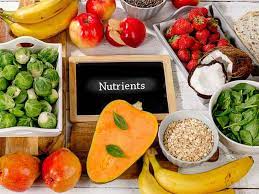Health & Medicine
How To Get The Most Nutrients From Your Food
by Admin
-
Friday, July 14, 2023
131 Views
If you are a good eater or trying to become one, you will realize that the basic step is to incorporate all the latest and most complete foods into your daily diet. . However, at least did you know that by planning your party with a specific goal in mind and incorporating specific foods, Iverheal 6 mg and Iverheal 12 mg you can increase your chances of retaining the extras from each pile. mess that you eat? Indeed, now you do!
Overall, would you say you’re ready to take your good diet game to the next level? Great, what if we were driving!
First of all, what kind of supplement is required by your body?
There are two types of supplements: macronutrients and micronutrients. Both are fundamental to maintaining your physical and psychological well-being.
Macronutrients are substances that provide energy or calories.
They understand:
Fat: This supplement is important for blood clotting, cell building, muscle growth, and the digestion of nutrients, minerals, and chemicals. “Count healthy fats, which are unsaturated fats (omega 3s found in fish and flaxseeds and monounsaturated fats found in foods like olive oil, nuts, seeds and avocados) can be helpful in combating joint pain, malignant growth and Alzheimer’s disease as Lyssie Lakatos and Tammy Disgraces, registered dietitian nutritionists, fitness trainers and nutritionists, say they combat the condition worsening condition. Major supporters of The Nutritionist Twins. Protein: Essential for growth, health, and support of the body, protein makes up the building blocks of cells, including bones, muscles, and hair. It is also needed for chemicals, antibodies and compounds. Carbohydrates: They are a source of fuel for your brain, muscles, and sensory system. The best carbs to choose from are whole grains, beans, foods that are grown from the ground up.
Again, micronutrients provide no calories. All else being equal, they incorporate nutrients and minerals that are essential for good health but are expected in modest amounts.
“There are 13 basic nutrients that the body needs to function properly, stay healthy and fight infection. Each nutrient plays an important and different role. Fights disease, including develop malignancies, maintain vision, and healthy skin and bones,” noted Disgraces.
Meanwhile, minerals are essential for the body’s basic abilities, such as managing digestion, maintaining hydration, and building strong bones and teeth. “For example, calcium helps strengthen bones, helps muscles contract and relax, and transmits nerve signals. Meanwhile, zinc is important for wound healing and anesthesia, and iron is needed for production. chemical production and red platelet formation,” she added.
Besides these two types of supplements, we have fiber and water. “Fiber refers to dietary supplements that are not processed by gastrointestinal protein but still play an important role,” says Lakatos. Primarily found in vegetables, natural products, whole grains, and hearts, fiber has a number of medical benefits, including reducing the risk of coronary heart disease and diabetes. Likewise, fiber keeps the entire intestinal system healthy.
Water, again, is considered a fundamental supplement because “the amount expected exceeds the body’s ability to make it. Every cycle of the body depends on water. Without it, we won’t be able to use the food and the supplements that come with it, she explained.
Anyway, what happens if you don’t consume enough of these supplements? “Your body can’t make supplements on its own, but has to get them from food,” explains Lakatos. diseases”.
“Iron deficiency is probably the most well-known supplemental deficiency. It affects a quarter of the total population,” she said. Vitamin D deficiency is also quite common. In fact, three-quarters of teenagers and adults in the US lack the “daytime nutrient.”
The dietitian adds: “Other side effects of nutrient deficiencies include baldness, weak hair and nails, watery gums, mouth sores, and dry skin.






